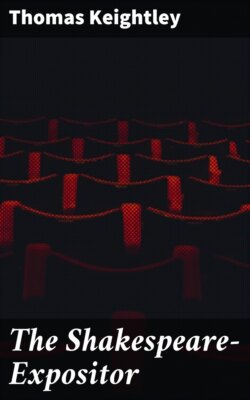Читать книгу The Shakespeare-Expositor - Thomas Keightley - Страница 59
На сайте Литреса книга снята с продажи.
13.
ОглавлениеThere was a peculiarity of the grammar of those days which is now confined to the vulgar, namely, that of joining a plural nominative with a singular verb, ex. gr.,
That in this spleen ridiculous appears,
To check their folly, passions solemn tears.
L. L. L. v. 2.
The rimes here and in several other places prove that this is no printer's error; and this construction is actually most frequent in Peele, Marston, and Fletcher—all University men! Editors, Mr. Dyce for example, are in the habit of taking the most unwarrantable liberty of altering this construction, except where restrained by the rimes. This practice is highly reprehensible and should be avoided; for we should give the text as it came from the poet's pen.
The origin of this structure is very simple. In the Anglo-Saxon the verbs made their plural in th, not in n, as afterwards became the usage. This plural of the verb occurs continually in the Vision of Piers Ploughman, and we find it not unfrequently even in the State Papers of the early Tudor period, in its later form; for, as in the singular, the th was gradually changed to s.
In the more artistic compositions of Chaucer and Gower, however, it is very rare. The following line in Chaucer,
As flakès fallès in grete snowes,
House of Fame.
shows that even in his time the th had been converted into s. The present practice, then, we may see is merely a change of fashion, and our ancestors' mode of forming the plural was perfectly correct and grammatical, with one exception—of which we still meet instances—that of using is and was as a plural. In my Edition of our poet's plays, I have therefore very generally preserved this structure; for we may alter orthography and punctuation, but not grammar.
On the other hand, I must maintain, in opposition to Mr. Dyce, that the union of a single noun with a plural verb was never a rule of the language, but always an error of the copyist, or a slip of the writer. Of this I can give positive instances.
I one day met in my own History of England the following words, "The blood of Catesby and two others alone were shed;" and on looking at the first edition I found of course that my word had been was. In Mr. Lloyd's Critical Remarks on Measure for Measure, in Singer's Shakespeare, we may read "the five acts of the first part of Promos and Cassandra concludes the iniquity of the deputy." Nor is this confined to English; in the Gerusalemme Liberata, and unnoticed by any editor, we find
Non si conviene a te, cui fatto il corso
Delle cose e de' tempi han si prudente.—x. 41.
In all cases it will be found to be the consequence of a noun of a different number having intervened between the nominative and the verb. Mr. Dyce, however, tries to make a rule of it by saying that "our early writers" did it when a genitive plural intervened; but that will not apply to passages like these—
Whose youth, like wanton boys through bonfires,
Have skipt thy flame.—Two Noble Kinsmen, v. 1.
The sea,
With his proud mountain-waters envying heaven,
When I say 'still!' run into crystal mirrors.
Valentinian, iv. 1.
Of others' voices, that my adder's sense,
To critic and to flatterer stopped are.
Shakespeare, Son. cxii.
This last is the error of the poet, who probably had ears in his mind; yet sense may be a collective: all the others are perhaps to be ascribed to the original printers.
The intensive particle be was prefixed to verbs much more frequently than at present. There was also a frequent ellipsis of the first personal pronoun before such verbs as cry, beseech, beshrew, &c.; and finally the habit—still retained by the vulgar—of cutting away the first syllable of a word prevailed to some extent.
